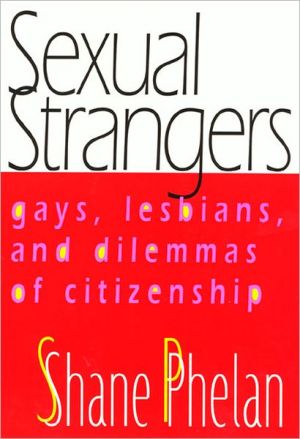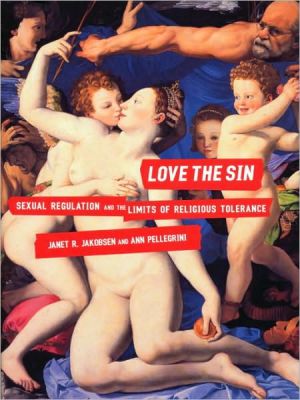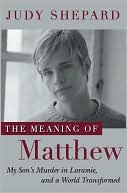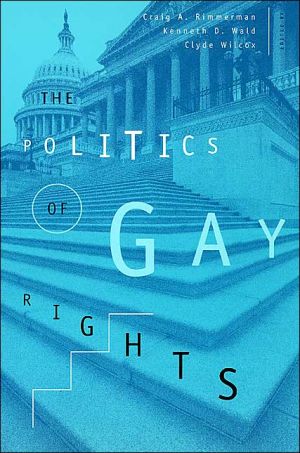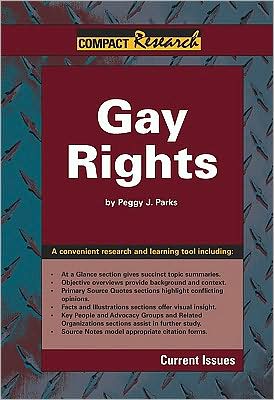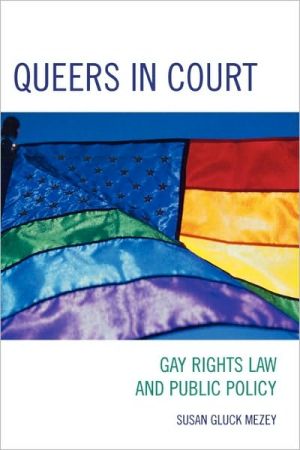Sexual Strangers
Is the United States a heterosexual regime? If it is, how may we understand the political position of those who cannot or will not align themselves with heterosexuality? With these provocative questions, Shane Phelan raises the issue of whether lesbians, gays, bisexuals, and transgendered people can be seen as citizens at all. Can citizenship be made queer? Or does citizenship require the exclusion of those who are regarded as queer to preserve the "equality" that it promises? \ \ In Sexual...
Search in google:
Is the United States a heterosexual regime? If it is, how may we understand the political position of those who cannot or will not align themselves with heterosexuality? With these provocative questions, Shane Phelan raises the issue of whether lesbians, gays, bisexuals, and transgendered people can be seen as citizens at all. Can citizenship be made queer? Or does citizenship require the exclusion of those who are regarded as queer to preserve the "equality" that it promises? In Sexual Strangers, Shane Phelan argues that, in the United States, queers are strangers-not exactly the enemy, since they are not excluded from all rights of citizenship, but not quite members. Rather, they are ambiguous figures who trouble the border between "us" and "them," a border just as central to liberal regimes as to other states. Life on this border structures both the exclusion of sexual minorities and their ambivalence about becoming part of the "mainstream." Sexual Strangers addresses questions of long-standing importance to minority group politics: the meaning and terms of inclusion, respect, and resistance. Phelan looks at citizenship as including not only equal protection and equal rights to such institutions as marriage and military service, but also political and cultural visibility, as inclusion in the national imaginary. She discusses the continuing stigmatization of bisexuals and transgendered people within lesbian and gay communities as a result of the attempt to flee from strangeness, a flight that inevitably produces new strangers. Her goal is to convince students of politics, both academic and activist, to embrace the rewards of strangeness as a means of achieving inclusive citizenship, rather than a citizenship that defines itself by what it will not accept. Library Journal Phelan (political science, Univ. of New Mexico; Playing with Fire: Queer Politics, Queer Theories) approaches gay rights in an intriguing new way. Instead of viewing such hot-button political debates as gay marriage and gays in the military as matters of public or social policy, the author argues that these issues are matters of citizenship. If granted to one citizen, they should be granted to all. Unfortunately, although the premise is appealing, it is based on a rather obtuse interpretation of feminist political theory, making what would otherwise be a challenging new treatise on gay rights a dense and cumbersome read. Moreover, detours into "phallic citizenship" and the "heterosexist regime" dilute the power of this promising new approach. In the end, the author concedes that in a democratic system, society's rules will change only when a majority finds the need for such change, a grudging acknowledgment of the power of our heterosexist regime. Academic libraries, particularly those with queer studies collections, will want to add this title, if only for the intriguing novelty of its approach.--Jeff Ingram, Newport P.L., OR Copyright 2000 Cahners Business Information.
AcknowledgmentsIntroduction11Citizens and Strangers112Structures of Strangeness: Bodies, Passions, and Citizenship373Structures of Strangeness: Citizenship and Kinship634Negotiating Strangeness: Assimilation and Visibility825Strangers among "Us": Secondary Marginalization and "LGBT" Politics1156Queering Citizenship139Notes163Bibliography165Index177
\ Library JournalPhelan (political science, Univ. of New Mexico; Playing with Fire: Queer Politics, Queer Theories) approaches gay rights in an intriguing new way. Instead of viewing such hot-button political debates as gay marriage and gays in the military as matters of public or social policy, the author argues that these issues are matters of citizenship. If granted to one citizen, they should be granted to all. Unfortunately, although the premise is appealing, it is based on a rather obtuse interpretation of feminist political theory, making what would otherwise be a challenging new treatise on gay rights a dense and cumbersome read. Moreover, detours into "phallic citizenship" and the "heterosexist regime" dilute the power of this promising new approach. In the end, the author concedes that in a democratic system, society's rules will change only when a majority finds the need for such change, a grudging acknowledgment of the power of our heterosexist regime. Academic libraries, particularly those with queer studies collections, will want to add this title, if only for the intriguing novelty of its approach.--Jeff Ingram, Newport P.L., OR Copyright 2000 Cahners Business Information.\ \
